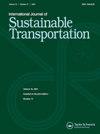评估交通规划在推进可持续发展目标中的作用:来自荟萃分析的见解
IF 3.9
3区 工程技术
Q2 ENVIRONMENTAL STUDIES
International Journal of Sustainable Transportation
Pub Date : 2025-10-03
DOI:10.1080/15568318.2025.2537667
引用次数: 0
摘要
本文通过综合元分析方法探讨了交通规划与实现可持续发展目标之间的复杂关系。该研究以系统理论(ST)为基础,将交通规划概念化为一个复杂的系统,其中包括基础设施、政策和社会经济因素在内的各个组成部分动态地相互作用,以影响可持续性结果。通过整合计划行为理论(TPB),该研究考察了利益相关者对交通相关决策的意图、态度和感知控制如何影响规划过程在推进可持续发展目标方面的有效性。此外,弹性理论(RT)被用于评估交通系统在气候变化、城市化和资源限制等挑战中适应、恢复和维持其功能的能力。采用亨特-施密特方法的元分析综合了31项研究的结果,对交通规划如何促进包括气候行动、可持续城市和经济增长在内的重大可持续发展目标提供了细致入微的理解。研究结果强调了积极规划在培育支持长期可持续发展目标的弹性和适应性交通系统方面的关键作用。该研究为政策制定者提供了可行的见解,强调需要一种综合方法,使交通规划与更广泛的可持续性目标保持一致,同时考虑到行为影响和交通系统的内在复杂性。这些发现有助于可持续发展的持续讨论,为加强交通规划在实现全球可持续发展目标中的作用提供了理论和经验基础。本文章由计算机程序翻译,如有差异,请以英文原文为准。
Assessing the role of transportation planning in advancing sustainable development goals: Insights from a meta-analysis
This article explores the intricate relationship between transportation planning and achieving Sustainable Development Goals (SDGs) through a comprehensive meta-analysis approach. Grounded in Systems Theory (ST), the study conceptualizes transportation planning as a complex system where various components, including infrastructure, policies, and socioeconomic factors, interact dynamically to influence sustainability outcomes. By integrating the Theory of Planned Behavior (TPB), the study examines how stakeholders’ intentions, attitudes, and perceived control over transportation-related decisions impact the effectiveness of planning processes in advancing SDGs. Furthermore, Resilience Theory (RT) is employed to assess the capacity of transportation systems to adapt, recover, and sustain their functions amidst challenges such as climate change, urbanization, and resource constraints. The meta-analysis using the Hunter-Schmidt method synthesizes findings from numerous 31 studies, offering a nuanced understanding of how transportation planning contributes to significant SDGs, including climate action, sustainable cities, and economic growth. The results highlight the pivotal role of proactive planning in fostering resilient and adaptive transportation systems that support long-term sustainability goals. The study provides actionable insights for policymakers, emphasizing the need for an integrated approach that aligns transportation planning with broader sustainability objectives while accounting for behavioral influences and the inherent complexity of transportation systems. These findings contribute to the ongoing discourse on sustainable development, offering a theoretical and empirical foundation for enhancing the role of transportation planning in achieving global sustainability targets.
求助全文
通过发布文献求助,成功后即可免费获取论文全文。
去求助
来源期刊
CiteScore
8.90
自引率
2.60%
发文量
56
期刊介绍:
The International Journal of Sustainable Transportation provides a discussion forum for the exchange of new and innovative ideas on sustainable transportation research in the context of environmental, economical, social, and engineering aspects, as well as current and future interactions of transportation systems and other urban subsystems. The scope includes the examination of overall sustainability of any transportation system, including its infrastructure, vehicle, operation, and maintenance; the integration of social science disciplines, engineering, and information technology with transportation; the understanding of the comparative aspects of different transportation systems from a global perspective; qualitative and quantitative transportation studies; and case studies, surveys, and expository papers in an international or local context. Equal emphasis is placed on the problems of sustainable transportation that are associated with passenger and freight transportation modes in both industrialized and non-industrialized areas. All submitted manuscripts are subject to initial evaluation by the Editors and, if found suitable for further consideration, to peer review by independent, anonymous expert reviewers. All peer review is single-blind. Submissions are made online via ScholarOne Manuscripts.

 求助内容:
求助内容: 应助结果提醒方式:
应助结果提醒方式:


